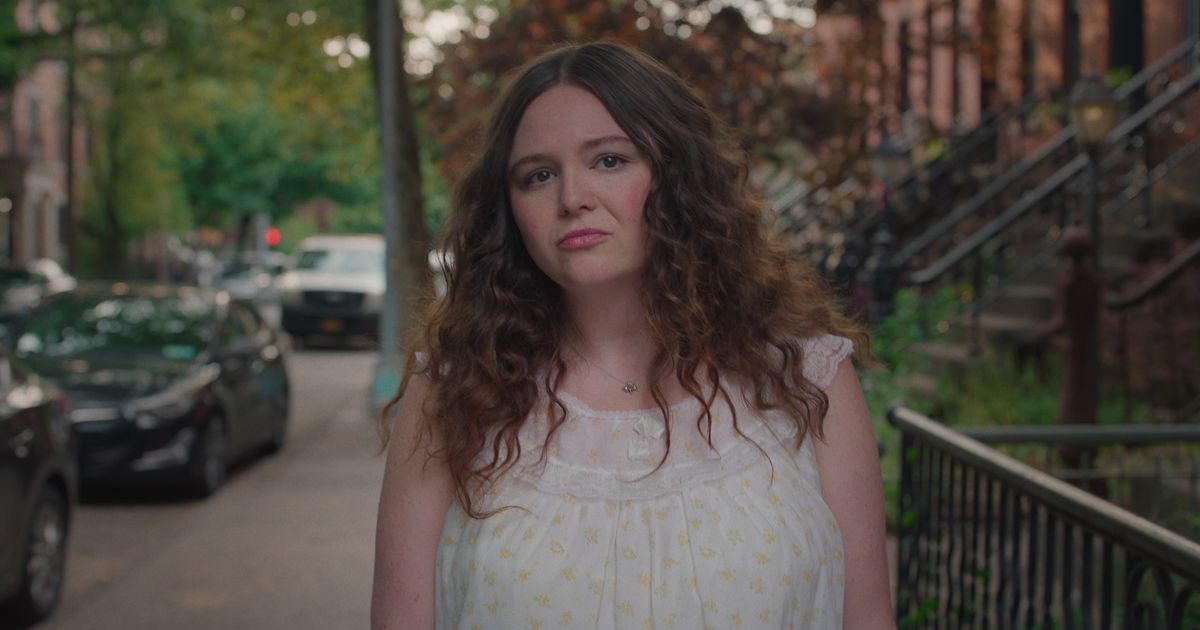
The Idea of Glue
Season 1
Episode 10
Editor’s Rating
5 stars
*****
Photo: Netflix
All season, running alongside the question of whether Jess and Felix were going to make it, was Jess’s journey of becoming. When we first meet her, Jess has lost control of her emotions — she breaks into Zev’s apartment and feels the need to address him via Wendy and her phone. Though she moved away from the source of her pain, she’s still beholden to it, and it’s not until her diary goes public that she realizes she can be a person independent of the limits she has placed on herself. In the season finale, she will also learn that she can be a person who can love and be loved despite her flaws; that she can be herself without worrying so much about being unique.
It’s a brilliant turn from Megan Stalter, who started the show self-conscious and ended it fully relaxed into her character. I was skeptical at the start, but by the time the show ends, she has struck a fine, compelling balance between being the character and being a comedian; Jess is funny in a Megan Stalter–character way, but unlike the people who populate her sketches, she’s not a caricature. While she may be extremely frustrating and often extremely selfish, you can’t help loving her.
In my recap of episode two, I brought up the rom-com’s focus on self-determination: At stake, along with the success or failure of romance, is the decision to be the version of yourself who can love and be loved despite discomfort. Doing the right thing is often hard, and it takes work to be the version of Jess that can rise to the occasion versus the one who chokes; it’s work to be the version of Felix who can transcend the temptation of his vices versus the one who gives in. And it’s not just our main lovers who embark on a journey of self-determination. In the finale, we get to see the happy reunion between Nora and Jameson — who have finally accepted that they do actually love each other, more than Jameson loved the Codies or his communal living space in Bushwick — as well as Kim’s embrace of her queerness, and Boss admitting that there is a person behind the character.
But as we’ve noted, in the rom-com, things have to get worse before they get better — and that’s especially true of the final act. When we open on “The Idea of Glue,” the vibes are dismal in the office because each person is going through their own crisis: Jess and Felix are broken up; it’s so awkward between Kim and Josie that Josie can’t even stand to be in the same room as Kim; Raven found a video of Boss in his erstwhile life as straight man named Gary in which he raps about getting girls. Boss, Kim, and Jess are laughing about the video when Jonno — who is weathering his own crisis, having been left by Ann with their untrained Irish wolfhound, Diane — comes to check in on them. No one is doing fine.
Least of all, Felix, who is packing up his stuff from Jess’s apartment. He leaves her half of a photo-booth strip and is almost out the door when Astrid starts breathing weirdly. He runs her to the vet, but it’s too late: Astrid dies on the vet’s examination table. It’s so sad. Astrid was such a star, a balm to Jess’s soul, and the best proof that Jess has it somewhere in herself not to be totally selfish — Astrid was the only being Jess could seemingly put above, or at least in equal stature, to herself. Astrid’s death really shakes Felix, who always had a special banter with the little dog. He apologizes to her repeatedly.
It’s all too damn much for Jess. By the time she makes it to the vet, Astrid is already gone, and she loses it on Felix outside. She yells at him that he’s a selfish, lying cheater, and he begs her for just a minute to get himself together. He gets so overwhelmed at her stream of accusations that he slaps himself in the face, but Jess is unmoved — she’s acting on the conviction that this is harder for her than anyone else. Felix retorts that it’s hard for everyone, and while he can admit to being “a piece of shit,” he wants her to admit that she is one too — or at least, that she can be one. But Jess can’t admit to ever being at fault. She throws everything she’s ever done for him in his face. “I’m good! I’m not a bitch! I’m good! I’m special and I’m bright and you don’t care,” she cries, trying to convince herself.
On the one hand, we know where this is coming from — after the disaster of her relationship with Zev, Jess is too scared to let her faults be exposed. But on the other hand, it’s impossibly frustrating that she sets the terms for a conditional kind of love: She will sing for Felix and take care of him just as long as he always thanks her and concedes that she is special and bright. Jess is a classic Lena Dunham character in that she is obnoxious, self-centered, and frustrating, particularly because she expresses all of those emotions that the rest of us, trying, like Jess, to be good and special and bright, keep under wraps. Her feelings are not exactly special or unique; she can’t get that through her head.
On the phone, Jameson advises her to come home. He tells her that he’ll represent her for ads, so they can kick-start her directing career. In the meantime, at the bar, Felix sings a melancholic tune about failed love, a rendition full of feeling. What a performance it’s been from Will Sharpe. I’m going to risk sounding cheesy because that’s what Too Much — not to mention Stalter and Dunham — brings out in a person, but it really seems like he’s singing from a broken heart. It made me think of when Jeremy Strong went on Marc Maron’s WTF podcast (RIP) and brought up something Al Pacino said, that good acting is about finding a way to really mean what you’re saying. At every point in Too Much, I felt like Sharpe meant it.
Because this is Netflix (money) and Lena Dunham (friends), we get a Taylor Swift needle drop as Jess looks through Astrid’s old nightgowns. Her phone pings: It’s a text from Wendy, who is in London for work and wants to talk. It’s the first time since the break-in that Wendy has emerged as a person rather than a figment of Jess’s thoughts; when they meet up at a coffee shop, Jess admits that she had spent a lot of time thinking about how this moment would happen. But all of her hypothetical scenarios — from winning “an Oscar for coolest ex-girlfriend” to whispering “you’re free” to Wendy at Zev’s funeral — didn’t account for Wendy as a full person, with thoughts and feelings of her own. Wendy the person is lovely. She is kind and chill and has a sense of humor. Emily Ratajkowski completely delivers.
Before meeting up with Wendy, Jess imagines herself walking back through her apartment with Zev, leaving the place in peace rather than in chaotic destruction. Wendy tells her that she’s been “putting stuff together” and realizing all the lies Zev has told her; for example, that he and Jess had been “separated” for six months before they started dating. She tells Jess that Zev is attracted to strong women only so that he can put them down, and that he’ll probably always find women to do this to, “but not us,” she says, extending a final olive branch by putting herself and Jess on the same plane of experience. Jess suggests they team up John Tucker style against him, but that’s not what Wendy is about. She’s dropping this, as much as she can, and moving on.
It’s the right idea: Jess can do that too. We are spared a cheesy ending in which Jess and Wendy become best friends, thankfully, but they leave on good terms. Wendy, wishing that Jess will find a person who is perfect for her, gives her a wise piece of advice: “I always say I can forgive pretty much anyone who’s willing to say ‘sorry.’ And who tells the truth.” It inspires Jess to follow Felix to a protest he’s attending with Auggie. She calls Gaz to drive her over, and on the way, they have an Almost Famous-plane-going-down moment when Gaz says that he’s in love with her, though at the end, they agree he’s not really — she’s just not constantly yelling insults at him like his mom, who we learn is the source of the profanities that keep Jess awake.
Felix, Auggie, and their fellow protesters have glued themselves to the pavement in protest of high emissions, and Jess glues herself right in front of Felix. They both admit to sabotaging the good thing they had, and Jess tells him that she doesn’t want to leave London without telling him how important he is to her. Finally, Jess can not only appreciate Felix as a whole, faults and all — “You’re wonderful, not despite your baggage but because of it,” she tells him — but more important, she can take accountability for her part in their demise. Her lesson is that staying true to herself doesn’t mean she can’t make allowances for other people; she can allow for fault in others as much as in herself. Besides, she doesn’t have to carry all that stuff around. “I want to feel light,” she declares.
Felix is happy to see Jess and receptive, even eager, to admit to his own part in all of it, too. But before they can finish the conversation, the cops come around and arrest Jess — though Felix literally runs away free. As they’re putting her in the cruiser, he asks her if she’ll marry him. We see Lois getting her hair washed by her new-old boyfriend; Dottie putting the Long Island house for sale; Nora and Jameson dancing sweetly in the living room; the girls from Hoxton Grove Estate hugging and making up; Raven holding Boss’s hand as he gets “Gary” tattooed on his chest; Ann and Jonno training Diane together; Kim reading a book about queerness. The Rita Ora Christmas commercial plays on shop windows.
And then, it’s Felix and Jess’s wedding day. Everyone is there, including the Three Pollys, who are still talking shit — but that’s just because Polly One’s heart is broken. Josie apologizes to Kim, and Simon gives us some facts about the etymology of the word matrimony. Jess wears a huge tulle bow and the ironic Nixon T-shirt. The last diary entry of the season is addressed to Jess, from Wendy, who is returning the shirt and thanking her for letting her borrow it.
Too Much ends with Lena Dunham calling cut on Jess and Felix’s wedding scene, and then showing us a couple of minutes of behind-the-scenes Super8 footage as the song that Felix sang at the bar comes back on; this time, it’s played by Attawalpa, Dunham’s husband and co-creator Luis Felber’s band, responsible for much of the show’s music. I loved this moment because it ruptures the fantasy once and for all — and that rupture, as we’ve known, is where real love begins.
VULTURE NEWSLETTER
Keep up with all the drama of your favorite shows!
Vox Media, LLC Terms and Privacy Notice
